
50 Short Essays on Wisdom | The Blindness of Retribution
The Blindness of Retribution
"An eye for an eye makes the whole world blind." - Mahatma Gandhi
The chilling image of a world consumed by blindness, a world where every act of vengeance begets another, echoes in Mahatma Gandhi's poignant words: "An eye for an eye makes the whole world blind." This seemingly simple proverb holds a profound truth, a timeless warning against the cyclical nature of retribution. It speaks not only to the futility of violence but also to the corrosive power of hatred and the urgent need for empathy and understanding. This essay will explore the historical roots of this wisdom, its enduring relevance in our contemporary world, and the transformative power of choosing a different path.
The concept of "lex talionis," or the law of retaliation ("an eye for an eye, a tooth for a tooth"), originates in the Code of Hammurabi, one of the oldest known legal codes, dating back to ancient Babylon. While initially intended to establish a system of proportionate justice, it laid the groundwork for a cycle of vengeance that could easily spiral out of control. The Old Testament also reflects this principle, though later interpretations emphasized forgiveness and mercy. Gandhi, deeply influenced by both ancient wisdom and the realities of colonial oppression, reinterpreted this ancient maxim, highlighting its inherent destructiveness. For him, it wasn't a call for pacifism alone, but a profound critique of the very nature of violence and its corrosive impact on the human spirit.
Gandhi's interpretation transcends a simple rejection of violence. It's a call for a fundamental shift in perspective. The "eye for an eye" mentality is predicated on a desire for revenge, a thirst for retribution that fuels a vicious cycle. Each act of violence, no matter how justified it may seem, only perpetuates the suffering. It blinds us to the humanity of the other, to the shared pain and suffering that underlies conflict. The true strength, Gandhi suggests, lies not in inflicting pain but in breaking the cycle, in choosing compassion over retaliation. This wisdom endures because it speaks to the fundamental human desire for peace and the inherent limitations of violence as a solution to conflict.
The consequences of "an eye for an eye" are tragically evident in modern conflicts. The endless cycle of violence in war-torn regions, the escalating tensions between nations, and even the seemingly minor acts of revenge in our personal lives all bear witness to the truth of Gandhi's words. Consider the ongoing conflicts fueled by ethnic hatred, the rise of extremist ideologies, or even the seemingly trivial online disputes that quickly escalate into hateful exchanges. Each act of retribution, each attempt to inflict pain, only deepens the wounds and obscures the path to reconciliation. The challenge lies in finding alternative approaches, in fostering empathy, and in building bridges of understanding across divides.
Gandhi's wisdom challenges us to examine our own responses to conflict, to confront our own capacity for anger and resentment. It invites us to consider the profound impact of our actions, not only on the immediate target but on the wider world. How can we break free from the ingrained patterns of retribution? How can we cultivate empathy and understanding in the face of injustice? The path is not always easy, but the potential rewards—a world less consumed by hatred and violence—are immeasurable. The question remains: will we choose blindness, or will we strive for a world illuminated by compassion?
Gandhi's simple yet profound statement remains a powerful call to action. The choice is ours: to perpetuate the cycle of violence, or to break free from its grip and embrace a path of peace, understanding, and forgiveness. The world, indeed, is waiting.
